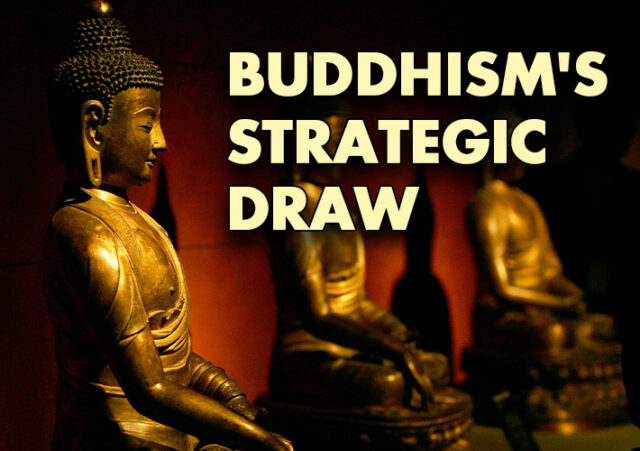What’s the next port of call for the Buddha relics that returned last month after a successful display in three cities of Thailand? There are plans to display them in Southeast Asia, said Rinpoche Jangchup Choeden, secretary-general of the International Buddhist Confederation based in Delhi, adding that there were requests from Cambodia and Vietnam.
“But displaying the relics requires a lot of preparation. It involves discussions at the bureaucracy level, then a decision from the political level. So, it’s not that simple but it is doable and it must be for the benefit of all involved.”
Choeden was speaking as a guest on The Gist show, and acknowledged that “A neighbor like China is investing a lot in Buddhism and Buddhist universities. I do believe that whether China or any other, as long as they treat Buddhism as a valuable part of their heritage, then they will definitely try to strengthen it or try to do something that is in their national interest.”
Many Chinese emperors were devout Buddhists, Choeden explained, which explains Buddhism’s huge influence in China. And, since China is surrounded by many Buddhist countries, it shares borders with a lot of Buddhist countries, from a strategic angle it makes sense for them to promote Buddhism. ideologically, of course it is strange for an officially atheist country and ruling establishment to get involved in religious philosophy and teachings. It appears to be using religion as a tool to achieve something, China maybe even trying to reinvent Buddhism.
“Buddhism is a very flexible and adaptive kind of religion. It isn’t rigid. There are also huge differences in terms of clothing, food and practices,” he noted, pointing out that in China they are also trying to reinvent Islam. They want Islam with a nationalistic approach. So they will definitely try to do the same with Buddhism.
Choeden says that he does meet Chinese Buddhist scholars from time to time usually while travelling, but meeting them in India does not happen often because in the past couple of years, due to the conflict between India and China at the border, movement between the two countries has become difficult.
India’s official involvement with Buddhism has gained pace since Narendra Modi took over as prime minister, says Choeden. He has shown a lot of interest in promoting Buddhism and including it in the Indian narrative. When he was addressing the UN, he said he comes from the Land of the Buddha, meaning that India gives peace to the world, not war. Buddhism, wherever it has gone, is originally from here. It is universally accepted that India is the home of the Buddha. And he spent much of his life here. The holy places associated with the Buddha are in India, and there is also one just across the border in Nepal.
Choeden acknowledges that Buddhism is present in India in low numbers, and this may seem a contradiction.
“But when we look at the historical perspective, the influence of Buddhism on India is huge, gigantic. So India taking ownership of Buddhism will strengthen Buddhism and be helpful to the international Buddhist community. India is seen by all Buddhist countries as a kind of holy land where Buddha walked, where Buddha taught, and India is where its roots lie. This is something the Indian government understands.”
But when the government talks of strengthening Buddhism at the national level, it doesn’t mean in competition with something else. Given that this great tradition has its roots in this country, it must be sustained. But Buddhism is a very, very deeply fragmented religion. It’s also very widely scattered. Buddhism doesn’t have a central headquarters. There are different traditions, and the Buddhism practiced in Sri Lanka will be very different from that practiced in Mongolia. And when these groups are put together, it would seem they are from completely different religions.
The International Buddhist Confederation thus provides an international platform for Buddhist followers. English is the language of communication even though it is a foreign language for the Buddhist people. Pali incidentally is not practical and is largely limited to the scholastic community.
As a secular state, there are limitations as to what the government can do to promote Buddhism, says Choeden. “We also need to understand the ground reality that India has so many other religions, all the resources cannot be focused on just one faith. So we have to be realistic. Hopefully after the election, there will be more things happening.”
















